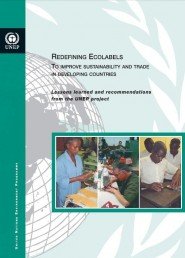New Publication: “Redefining ecolabels to improve sustainability and trade in developing countries: Lessons learned and recommendations from a UNEP project”
In 2012, at the invitation of the United Nations Development Programme (UNEP) Sustainable Consumption and Production branch, I had the pleasure of interviewing and working with dozens of stakeholders from over a dozen countries to explore how ecolabels are encouraging sustainable development and improving international trade opportunities. The report “Redefining ecolabels to improve sustainability and trade in developing countries: Lessons learned and recommendations from a UNEP project” explores both the history and background of ecolabelling as a tool to promote sustainable production and consumption and to evaluate a specific five-year UNEP project.
You can download the report here on the new (and very informative) Sustainable Production and Consumption Clearinghouse.
More about this report from the introduction:
This report aims to evaluate to what extent the project succeeded in reaching its intended goals, to draw lessons learned, and present recommendations for future actions. The report contains four major sections. Section I introduces readers to ecolabels and the differences between different information systems, provides an overview of how these systems are used in developed and developing countries as well as introduces the major challenges, opportunities, and debates around voluntary labelling and standards globally.
Section I also traces the debates about ecolabels as possible barriers to trade. This includes possible implications of recent World Trade Organization cases and other issues affecting the discussions on Technical Barriers to Trade, and the relevance of this UNEP project to the debates, including the importance of working with established rules, practices, and disciplines that avoid unnecessary barriers in developing and using internationally-accepted ecolabels.
Section II introduces the UNEP ‘Enabling developing countries to seize ecolabelling opportunities’ project and partners, and the assessment methodology.
Section III of this report focuses on the assessment of the project results in relation to its goals. This section is based on interviews with key stakeholders in the project, as well as background research. It reviews the project as a whole, including a sector and country analysis. It describes the baseline situations and major developments that happened during the five years of the project.
Section IV provides lessons learned and recommendations to project partners and other stakeholders on further improvement and future projects. Suggestions are targeted toward all stakeholders involved in the ecolabelling field.
The report’s methodology is based on the compilation and review of all project documents and relevant literature on trade and ecolabels. It also involved interviews with participants from the project, including funders, implementing bodies, country partners, and some target enterprises when available.

